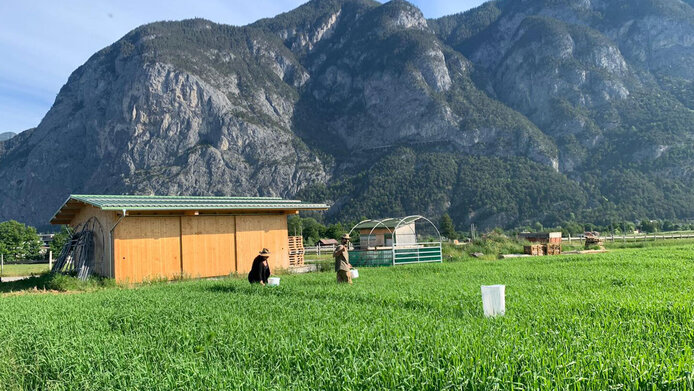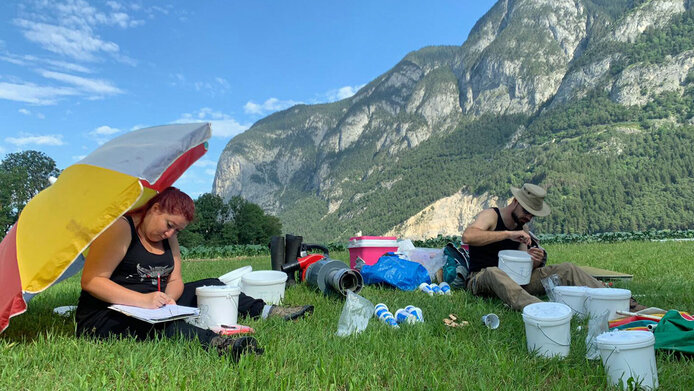Ground beetles for a sustainable food supply

While not a particularly well known group of beneficial insects, carabids, also known as ground beetles, constitute the beetle family that is richest in species, with over 6,000 species in Europe alone. “Compared to ladybirds, ground beetles are much less widely recognised as beneficial insects,” says ecologist Corinna Wallinger. This induced her to initiate a project funded by the Austrian Science Fund FWF to investigate the regulation of weeds by ground beetles in the ecosystem of cereal fields. Wallinger and her team discovered that the beetles’ role in agriculture has previously been undervalued.
DNA from beetle food
In order to study the insects, the research team set up pitfall traps, which are essentially beakers buried in the ground flush to the surface, as principal investigator Wallinger explains: “The beetles fall into the traps, which are emptied daily.” Wood chips were placed in the cups for the animals to be able to hide from each other. The team then examined the stomach contents of the beetles in the laboratory, which means that it was not necessary to kill them for this. “Ground beetles have this natural defence mechanism that makes them regurgitate their food when they are stressed,” notes Wallinger. “We make use of that and place the beetles head first into small vessels that were briefly heated at the tip, which is enough of a stimulus for the beetles to regurgitate their stomach contents.” The animals could then be released back into nature. In this way, the team collected samples from 6,500 ground beetles in cereal fields between France and Austria.
The researchers then analysed the stomach contents using molecular methods comparable to the PCR tests for Covid-19, with the difference that they were not looking for viral RNA but for the DNA of certain species in their food. They found that plant seeds are a popular food for ground beetles, and much more so than previously thought. So far, knowledge about the food choices of ground beetles had largely been based on observations and correlative analyses. This study was the first to demonstrate empirically what these small and extremely mobile creatures actually do in the field.
Beetles as “vaccine” against pests
Wallinger's colleague and project team member Oskar Rennstam Rubbmark underlines the importance of ground beetles in agriculture by explaining that, unlike other beneficial insects such as ladybirds, which feed on aphids only, carabids are “generalists” that do not feed on a particular food item. In addition to weed seeds, they also feed on a wide variety of pests, such as aphids and slugs, more precisely the eggs of the latter. Rennstam Rubbmark illustrates this by using a medical comparison: “In the agricultural system, ground beetles play the role that vaccinations play in medicine. In a best case scenario, they prevent pests from spreading explosively because they are already in place when the pests arrive in the field. Only when that goes wrong can the specialised beneficial insects conduct damage control.” In this comparison, the latter are the drugs that are applied only when the disease has already broken out.
Sustainable agriculture
For practical implementation of their new findings, the two researchers do not primarily have organic agriculture in mind, whose value they emphasise categorically. “Organic is great,” says Rennstam Rubbmark, “but it only works in certain landscapes where the conditions are optimal and even then only to a certain extent.” Wallinger agrees, and adds: “The idea of untouched nature, left completely to its own devices and automatically self-regulating, is not feasible in agriculture. In order to be able to feed the world's population, we need an optimum yield, which means the sustainable management of agricultural surfaces. This requires a functioning, self-regulating system.” The current strategy in conventional agriculture involves intensive fertilisation and tillage in concert with the use of chemicals for pest and weed control. But this approach clearly has an expiry date; it may work for about the next 40 to 50 years. Hence, alternatives need to be found in good time.
Green strips to improve the situation
And what could plant protection using ground beetles actually be like in the future? Wallinger rejects the notion of releasing swarms of beneficial insects: “That only works under certain conditions, as for instance in glass houses or vegetable tunnels.” Narrow flower strips between fields that remain uncultivated, so-called “beetle banks”, are a simple and effective measure. “Experience has shown that they host a particularly large number of ground beetles. From there, the animals can migrate into the fields and retreat again if necessary,” explains Wallinger. Another prerequisite is a reduction in the use of chemicals. Rennstam Rubbmark points out in that many carabid species of these beetles, which all have a comparable food spectrum to a certain extent. The occurrence of the species is subject to seasonal fluctuations. In a functioning system, there would always be one species that could take over pest regulation when another drops out due to a disturbance that might occur. Just another proof that biodiversity is a crucial factor.
How do the farmers react?
A follow-up project, also funded by the FWF, was launched recently. The team from the Department of Zoology now wants to study at EU level how the knowledge gained can be put into agricultural practice. They employ a socio-economic approach, including farmers and other stakeholders to discover their perspectives. It is crucial to know what farmers need, and what their concerns and difficulties are. Even before the launch farmers have already shown themselves to be basically open to alternative methods such as measures to promote beetle populations. It is not in the farmers' interest to poison themselves and their fields or to leach the soil. “They are particularly interested in preserving healthy farmland for future generations,” reports Wallinger. Over the many years of her work, only one farmer refused cooperation; all others she approached were open to cooperation and very interested in the research results.
Personal details
Corinna Wallinger is an ecologist who focuses on the interaction of plants and insects. She conducts research in the Department of Zoology at the University of Innsbruck and, together with partners, has founded a company that focuses on DNA analysis.
Oskar Ragnar Rennstam Rubbmark also conducts research in the Department of Zoology at the University of Innsbruck, and his research interests lie inter alia on the function of the ecosystem with a special focus on insects and their role as natural pest regulators in agriculture.
The project “Carabid beetle ecosystem services” ran for five years and was completed in 2021. It received EUR 348,000 in funding from the FWF. The follow-up project “Farmer acceptable Restoration of Habitats (FRESHH)” started in March 2022 and is scheduled to run for three years as part of the European partner programme BioDivERsA. It is co-financed by the FWF with EUR 256,000.
Publications
Frei B., Guenay Y., Bohan D.A. et al.: Molecular analysis indicates high levels of carabid weed seed consumption in cereal fields across Central Europe, in: Journal of Pest Science 92, 2019
Staudacher K., Rennstam Rubbmark O., Birkhofer K., et al.: Habitat heterogeneity induces rapid changes in the feeding behaviour of generalist arthropod predators, in: Functional Ecology 2018






